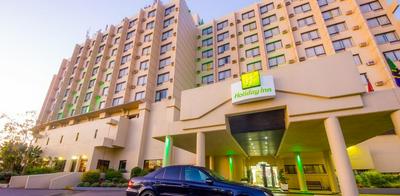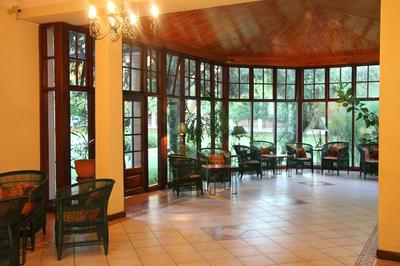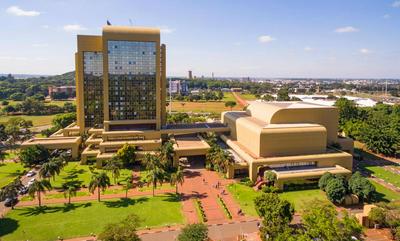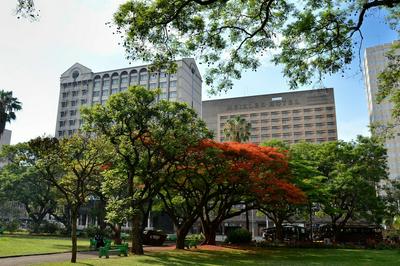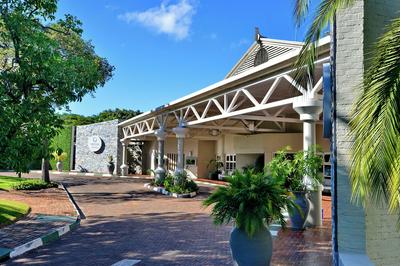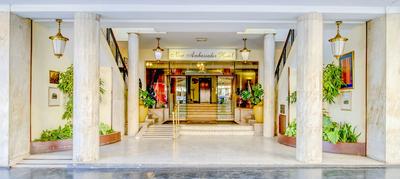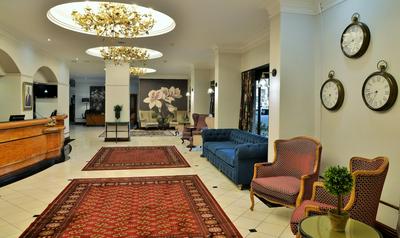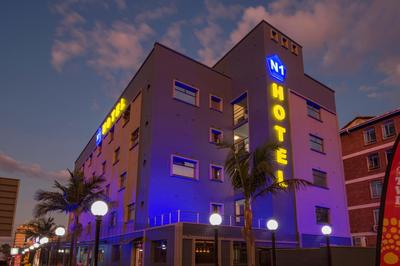When to visit Harare?
Harare, the vibrant capital of Zimbabwe, offers a unique experience throughout the year, but the best periods to visit are from May to October. During these months, the weather is cooler and drier, making it perfect for outdoor adventures and sightseeing. The peak travel season is during the dry winter months of June to August when daytime temperatures range from 20°C to 25°C (68°F to 77°F) and nights can be quite chilly.
Summer, from November to March, is characterized by warmer temperatures, often exceeding 30°C (86°F), and is the rainy season. While rain showers can be frequent, this season sees a lush landscape, making it a beautiful time to explore the numerous parks and gardens in the city. However, it's essential to note that the humidity can be quite high, which might not be comfortable for everyone.
In autumn, from March to May, temperatures start to cool down as the rain subsides. This transitional period is also relatively peaceful in terms of tourist flow, making it a pleasant time for visitors who prefer less crowded attractions. Spring in Harare, from September to November, brings warmer weather, signaling the start of a new flowering season, perfect for photography enthusiasts and nature lovers.
In summary, while Harare can be visited year-round, the cooler, dry months of May to October are ideal for exploring its attractions, enjoying outdoor activities, and experiencing the local culture.
How to get to Harare?
Getting to Harare is relatively straightforward, as it serves as a major hub for various transport options. The primary point of entry by air is Harare International Airport (HRE), located about 15 kilometers (9 miles) from the city center. Several international airlines, including Kenya Airways and Ethiopian Airlines, operate flights into Harare, connecting it to numerous destinations across Africa and beyond. Once you arrive at the airport, you can expect around a 30-minute drive to the city center, depending on traffic.
If you prefer traveling by road, there are numerous bus services operating from cities like Bulawayo and Mutare, with travel times ranging from 5 to 8 hours. The main bus terminals in Harare are located in the city center and are serviced by several companies, ensuring frequent departures.
Another option is to travel via train; however, train services can be less reliable compared to buses. The National Railways of Zimbabwe operates services that connect Harare with other major cities, taking around 10 hours from Bulawayo, though some delays are common.
For those who wish to drive, Harare is accessible via the A3 highway from South Africa and the A5 from Mozambique. However, road conditions can vary, so it’s advisable to check local advice before setting out. Once in the city, having a car can be convenient, given the public transport options may not be the most reliable.
Tourist activities in Harare
Harare is a bustling city with a range of activities that cater to all interests. For those who appreciate culture, visiting the National Gallery of Zimbabwe is a must. This gallery showcases contemporary African art and hosts various exhibitions throughout the year. Another cultural landmark is the Zimbabwe Museum of Human Evolution, where you can delve into the rich history of humanity.
Outdoor enthusiasts will enjoy Harare Gardens, a serene spot perfect for picnics or leisurely walks. The gardens are home to a variety of plant species and even a small zoo. Mukuvisi Woodlands, located just outside the city, offers guided nature walks and the chance to spot wildlife like zebras and antelopes.
Shopping aficionados can explore Avondale Flea Market for souvenirs, local crafts, and delicious street food. For a more upscale experience, visit Sam Levy’s Village in Borrowdale, where you'll find international brands and cozy cafes.
As the sun sets, Harare's nightlife comes alive with several bars and clubs. Whether you prefer a quiet drink at a local pub or dancing the night away at a lively club, there’s something for everyone. Be sure to try local beer varieties!
For families, the Lion and Cheetah Park offers an exciting encounter with wildlife, providing opportunities to see these majestic animals up close. It's a perfect day trip for a memorable experience.
Events and festivals
Harare hosts a vibrant array of events and festivals throughout the year, showcasing the rich culture and traditions of Zimbabwe. One of the most anticipated is the Harare International Festival of the Arts (HIFA), typically held in April or May. This annual celebration brings together local and international artists, including musicians, dancers, and visual artists, transforming the city into a cultural hub.
Another significant event is the Zimbabwe International Trade Fair (ZITF), held in April, attracting exhibitors and visitors from across the globe to discuss trade opportunities and innovations. This fair is a fantastic opportunity to network and learn more about Zimbabwean industry.
In September, the Harare Book Festival showcases literature, providing a platform for authors, poets, and storytellers to connect with their audience through readings, discussions, and workshops.
During the festive season, Christmas in Harare brings traditional celebrations with local markets, music performances, and family gatherings. New Year’s Eve is also lively, with various venues hosting celebrations and fireworks displays across the city.
Don't miss the numerous cultural festivities that often celebrate historical events or local traditions, reflecting the community's spirit and pride. These cultural expressions are a great way to immerse yourself in the heart of Harare.
Family and kids activities
Families visiting Harare will find plenty of engaging activities for kids of all ages. Harare's parks, such as Harare Botanical Gardens and the expansive Chisipite Park, are perfect for family outings. With spacious areas for children to run around and play, these parks also provide picnic spots and beautiful scenery.
The Lion and Cheetah Park is a popular choice for families looking for adventure. It offers opportunities to see lions, cheetahs, and other wildlife up close. Kids will be thrilled with the chance to interact with some animals, making for an unforgettable experience.
For a more educational outing, the Natural History Museum is an excellent spot to explore the region's flora and fauna. Kids will enjoy the dinosaur replicas and exhibits showcasing Zimbabwe's rich biodiversity.
On rainy days, the PlayStation, an indoor play center, offers a range of activities from climbing walls to arcade games, ensuring the kids stay entertained. Additionally, visiting the National Gallery can spark kids’ creativity with art workshops designed for younger audiences.
Lastly, don’t miss the various children's festivals held throughout the year, which often include entertainment, crafts, and educational activities that the whole family can enjoy.
What to see in Harare?
Harare is a city rich in attractions that offer visitors a variety of experiences. Here’s a list of essential sites to include in your itinerary:
- National Gallery of Zimbabwe: Showcases a stunning collection of Zimbabwean and international art, perfect for art lovers.
- Zimbabwe Museum of Human Evolution: An insightful museum displaying significant finds related to human evolution and history.
- Harare Gardens: A beautiful green space ideal for relaxing strolls amidst flora and fauna.
- Mukuvisi Woodlands: A well-protected natural reserve providing opportunities for wildlife encounters.
- Avondale Flea Market: A vibrant market famed for local crafts, food, and a lively atmosphere.
- Chisipite Shopping Centre: Offers a range of shops for a delightful shopping experience.
- Domboshava Rocks: A short drive from the city, these stunning rock formations and ancient paintings are a sight to behold.
- National Heroes Acre: A memorial honoring Zimbabwe’s liberation fighters, providing insights into the nation's history.
These attractions will give you a well-rounded taste of Harare’s culture, art, and natural beauty.
Accommodation in Harare
Harare offers a diverse range of accommodation options to suit every traveler’s budget. From luxury hotels to budget-friendly hostels, there’s something for everyone.
For a luxurious stay, consider the Meikles Hotel or the Rainbow Towers, both situated in the city center, offering top-notch amenities and fine dining experiences. These hotels often host business travelers and provide stunning views of the city.
If you’re looking for something more mid-range, the Holiday Inn Harare or the Bronte Hotel provide comfortable accommodations with good service and convenient locations nearby attractions.
Backpackers and those on a budget will find charming hostels like the Trekker's Lodge or various guesthouses scattered around areas such as Avondale and Eastlea, with prices that won’t break the bank.
For a unique experience, consider renting a self-catering apartment in the Borrowdale area, which offers spacious living and a home-like environment. This is ideal for families or those preferring longer stays.
When choosing accommodation, consider the neighborhood you prefer. The city center offers proximity to shopping and nightlife, while areas like Borrowdale provide a more suburban feel with easy access to nature and scenic spots.
Important numbers and information
- Emergency Number: 999 (Police, Fire, Medical)
- Tourist Information Centers: Zimbabwe Tourism Authority (ZTA) at Harare International Airport
- Main Hospitals: Parirenyatwa Group of Hospitals, Harare Central Hospital
- Airport Contact: Harare International Airport (HRE) - +263 242 575 000
- Public Transport Information: Harare City Council Transport Division - +263 242 774 200
- Taxi Apps: Bolt, Uber
- Currency: Zimbabwean Dollar (ZWL); Credit cards widely accepted in urban areas
- Payment Methods: Cash preferred for local markets and small transactions
Where to eat?
Harare boasts a vibrant culinary scene that blends traditional Zimbabwean flavors with international cuisine. For a taste of local dishes, head to the popular eateries in the city. One must-try dish is Sadza, a staple made from maize flour, often served with a variety of tasty relishes such as vegetables, meat, or fish.
The Mbare Market is a great spot to sample street food, including skewers of grilled meat known as 'sadza nemuriwo' and fresh fruits. It’s an immersive experience that truly reflects local flavors.
For a more upscale dining experience, restaurants like The Monomotapa Hotel offer continental menus with a touch of local flair, while popular places like Harvest Garden provide a relaxing atmosphere with a broad menu.
If you’re in the mood for international cuisine, head to areas such as Sam Levy's Village, where you’ll find options like Indian, Chinese, and Italian restaurants. These are perfect if you’re looking for a different flavor after a few days immersed in local food.
Overall, dining in Harare is reasonably priced, with meals in mid-range restaurants typically costing around $10-$20 per person, making it affordable to explore the culinary culture.
Nightlife – where to go out?
Harare's nightlife is as diverse as its culture, offering something for everyone looking to have a good time after dark. The city is filled with vibrant bars, trendy clubs, and lively entertainment districts. One of the most popular areas to experience nightlife is in the Avenues and Avondale neighborhoods, where you will find eclectic bars and clubs.
Start your night at The Well, known for its great ambiance and signature cocktails. For something more energetic, head to Club Red, a local hotspot featuring a mix of local and international DJs, ensuring the dance floor is always lively.
If you prefer a more laid-back vibe, stop by the Book Café, a trendy bar and cultural hub that often hosts live music and art displays. It's a perfect spot to unwind while enjoying good conversation and local art.
For clubbing, the luxurious Nightlife Club offers an upscale ambiance with an exclusive feel, while Jack's Bar is known for its fun atmosphere and affordable drinks, attracting a younger crowd. Both showcase the local music scene, making them a great choice for experiencing Harare's cultural rhythm.
Whether you seek vibrant clubs or cozy bars, Harare’s nightlife is sure to offer a memorable experience, reflecting the city's energy and diversity.
Transport and taxis
Navigating Harare is relatively manageable, with several public transport options available. The city’s bus services, including commuter omnibuses, are the most popular way to travel. These buses are cheap, but they can be very crowded, especially during peak hours. Tickets usually cost around $0.50, and it's advisable to carry cash as not all transport accepts card payments.
For a more comfortable ride, taxis can be hailed on the street or arranged via apps like Bolt and Uber, which have gained popularity in recent years. It's important to negotiate the fare upfront if taking a meter taxi, as many do not use meters.
Safety is a concern when using public transport. It’s best to avoid traveling at night, and always secure your belongings. With rideshare apps, safety features like tracking your trip can provide peace of mind.
Walkable neighborhoods such as the city center allow for easy exploration on foot, especially for those staying in central areas. If you prefer exploring further, renting a car is also an option, but be cautious of local driving conditions and traffic regulations.
For best results when getting around, consider a mix of public transport for short distances and taxis for longer journeys or after sunset. This way, you can experience the city like a local while also ensuring your safety.
Parking and public garages
Parking in Harare can be a challenge, but knowing where to look can make it easier. There are several designated parking zones throughout the city, with both on-street and off-street options available. On-street parking is generally found around shopping areas and business districts, while public garages are available near major attractions and central areas.
Prices vary, with on-street parking typically costing about $1-$2 per hour, while off-street garages may charge a daily flat rate. It's crucial to check signage to ensure compliance with local parking regulations to avoid fines.
For safer options, opt for secured parking lots where available, especially if leaving your vehicle for an extended time. Many hotels also offer parking facilities for guests, making them a convenient choice for travelers coming by car.
Another tip for driving in Harare is to be cautious of poorly marked roads and unexpected potholes. Always plan your route in advance and ensure you have a parking plan upon reaching your destination. A bit of patience goes a long way as you navigate this bustling city.
Surroundings of Harare
Exploring the surroundings of Harare reveals a wealth of natural wonders and cultural sights ideal for day trips. Approximately 30 kilometers (19 miles) northeast of the city, you’ll find the stunning Domboshava, a site known for its incredible rock formations and cave paintings created by ancient civilizations. A visit will not only provide excellent hiking opportunities but also insights into Zimbabwe's heritage.
Another beloved spot is Lake Chivero, located about 50 kilometers (31 miles) from Harare. It's a hotspot for wildlife enthusiasts; you might spot hippos, crocodiles, and various bird species. The lake is also a fantastic place for picnics and leisure activities like kayaking and fishing.
For those interested in history, a trip to the town of Marondera, about 70 kilometers (43 miles) away, offers cultural experiences, including local markets and traditional dance displays. The journey will showcase the beautiful countryside and rural life.
Lastly, the Nyanga National Park, a little further afield, is a breathtaking destination known for hiking trails amidst picturesque landscapes and waterfalls. It takes around 3 hours to reach from Harare but is well worth the trip for nature lovers.
These nearby locations provide a glimpse of Zimbabwe's natural beauty and cultural heritage, making them perfect escapes from the city bustle.

